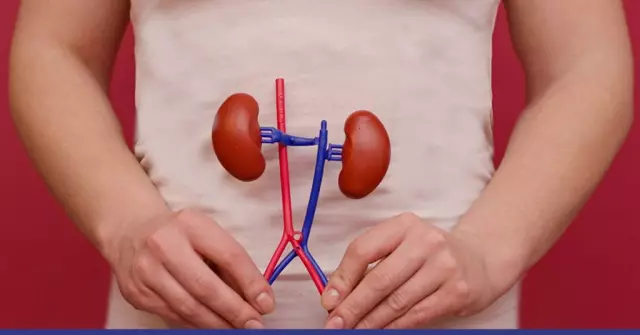- Author Rachel Wainwright wainwright@abchealthonline.com.
- Public 2023-12-15 07:39.
- Last modified 2025-11-02 20:14.
Child after the flu

Influenza is an acute infectious disease that affects the upper respiratory tract and is caused by the influenza virus. To date, medicine is aware of more than 2000 strains of the influenza virus, which differ in the antigenic factor. The influenza virus has a high ability to modify, developing resistance to the used antiviral drugs. Immunity to one strain of the virus remains in the body for 1-4 years. Influenza is dangerous for the development of serious complications. How to properly restore a child's body after the flu? What are the most dangerous complications after influenza in children? Why is the flu vaccine needed?
Flu. Infection mechanisms. Complications after influenza in children
Influenza is one of the most insidious infectious diseases. The influenza virus is rapidly mutating, creating new resistant forms characterized by an updated symptomatic complex that is difficult to diagnose. The source of the infection is a person who carries the virus in a mild form. The virus is transmitted by airborne droplets, mainly affecting the upper respiratory tract. The external environment for the influenza virus is destructive. However, at low temperatures, the virus can remain active for up to several months, which explains the widespread spread of the virus during the cold season. The spread of influenza is facilitated by closer contact with people in enclosed spaces, weakening of the body due to lack of vitamins. The main symptoms of the flu are:
- Increased body temperature;
- Increased fatigue;
- Aches in muscles and joints;
- Strong headache;
- Pain when moving the eyeballs;
- Respiratory tract damage;
- Lack of appetite;
- Redness of the mucous membranes;
- Sore throat, dry cough.
The child's body is most susceptible to the flu virus. After the flu, the child's body is weakened and requires proper recovery. Influenza is characterized by a similar symptomatic complex with colds. If a child is suspected of having influenza, a pediatrician should be seen to confirm the diagnosis and appropriate treatment. The virus is extremely dangerous not with an acute course, but with the development of complications after influenza in children, which include:
- Primary viral pneumonia (characterized by high mortality, most often occurs if the flu is caused by a virus of high virulence);
- Secondary bacterial pneumonia;
- Secondary bacterial infections (otitis media, bronchitis, rhinitis, sinusitis);
- Reye's syndrome is an acute condition in children that develops against the background of treatment of fever of a viral origin (including influenza) with acetylsalicylic drugs. This condition in a child after the flu can lead to the development of encephalopathy (due to cerebral edema);
- Complications from the respiratory system, cardiovascular system;
- Muscle inflammation (myositis);
- Accession of a secondary infection in a weakened child's body after influenza (staphylococcal, pneumococcal);
- Exacerbation of chronic diseases.
The development of complications after the flu can be prevented by timely treatment of the virus, as well as by correct recovery of the child's body after the flu.
Complications after influenza occur, as a rule, in children whose bodies were weakened before being infected with the virus. Also, complications after the influenza virus can occur against the background of incomplete treatment with the disappearance of the primary symptoms of the disease.
Child after the flu: correct recovery of the child's body
Correct recovery of the child's body after the flu is the main measure to prevent the development of complications after the transferred virus. After the flu, the child retains some symptoms:
- Lack of appetite;
- Lethargy;
- Fast fatiguability;
- Drowsiness.
These symptoms are explained by the weakening of the body's defenses. How long does it take for a child to recover from the flu? First you need to understand that not only the flu virus negatively affects the child's body. Antiviral treatment also negatively affects the state of the body, affecting the liver, gastrointestinal tract. Against the background of taking antibiotics, the healthy intestinal microflora is disturbed, for the restoration of which not only drugs are needed, but also an appropriate diet.
Proper recovery from the flu for a child includes:
- Sparing day regimen;
- A lightweight diet that helps restore the intestinal microflora, the violation of which is caused not only by taking antibiotics, but also by dyspeptic symptoms (vomiting, diarrhea). Pediatricians and nutritionists recommend eliminating heavy foods (foods containing coarse vegetable fiber, fermenting, and others). The most optimal dishes during the child's recovery from the flu will be fruit and vegetable purees, milk porridge, yoghurts, cottage cheese, low-fat cheese;
- Natural fortification of the body - fresh fruits, vegetables, freshly squeezed juice. Vitamin complexes as prescribed by a pediatrician;
- Restoring the respiratory system - inhalations with herbs, herbal preparations;
- Restoration of immunity. The body's defenses of the child after the flu are restored extremely slowly, during this period it is important to protect the child from contact with potential sources of infection in order to avoid re-infection.
Many parents make a critical mistake by canceling the child's treatment as soon as the primary symptoms of flu disappear, which further weakens the child's body. Also, the child after the flu must be carefully examined. Pediatricians do not recommend returning to the normal rhythm of life (visiting kindergartens, schools, studios) within 10-12 days after illness for the natural recovery of the body's strength and in order to avoid re-infection.
Flu vaccination. What to do if a child gets sick after a flu shot?

Influenza vaccination is the main prevention measure for the annual epidemic of the virus. Influenza vaccine belongs to a group of biological drugs that provide short-term immunity to a particular influenza virus. However, influenza vaccination does not rule out the possibility of infection. A flu shot significantly reduces the risk of infection, the likelihood of complications, and also makes the disease easier. What if my child gets sick after getting the flu shot?
With the manifestation of the primary symptoms of flu (chills, lethargy, body aches), the child is shown bed rest with an abundant fortified drink (vitamin C). A child with suspected influenza virus should be shown to the pediatrician, informing about the vaccination, in order to prescribe the appropriate treatment.
Why can a child get sick after a flu shot? This is due to the fact that a child is vaccinated against one influenza virus and becomes infected with another. Every year, a vaccine is developed against the influenza viruses most likely to cause the current year's epidemic.
Found a mistake in the text? Select it and press Ctrl + Enter.






